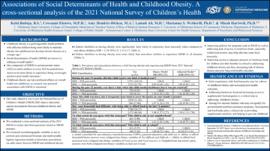| dc.contributor.author | Batioja, Kelsi | |
| dc.contributor.author | Elenwo, Covenant | |
| dc.contributor.author | Hendrix-Dicken, Amy | |
| dc.contributor.author | Ali, Lamaii | |
| dc.contributor.author | Wetherill, Marianna S. | |
| dc.contributor.author | Hartwell, Micah | |
| dc.date.accessioned | 2023-11-02T20:44:15Z | |
| dc.date.available | 2023-11-02T20:44:15Z | |
| dc.date.issued | 2023-02-17 | |
| dc.identifier | ouhd_Batioja_associationsofsocialdeterminants_2023 | |
| dc.identifier.citation | Batioja, K., Elenwo, C., Hendrix-Dicken, A., Ali, L., Wetherill, M. S., and Hartwell, M. (2023, February 17). Associations of social determinants of health and childhood obesity. A cross-sectional analysis of the 2021 National Survey of Children’s Health. Poster presented at Research Week, Oklahoma State University Center for Health Sciences, Tulsa, Ok. | |
| dc.identifier.uri | https://hdl.handle.net/11244/339889 | |
| dc.description.abstract | Background: Childhood obesity is a growing health problem in the United States, with those affected having an increased likelihood of developing chronic diseases at a younger age. Social determinants of health (SDOH) are known to influence overall health. Children with low socioeconomic status (SES) have been shown to be overweight and have poor health outcomes. Therefore, our primary objective was to use the National Survey of Children’s Health (NSCH) 2021 data to determine current associations between childhood obesity and social determinants of health (SDOH). | |
| dc.description.abstract | Methods: We conducted a cross-sectional analysis of 2021 NSCH to extract data from questions related to the SDOH domains. We extracted sociodemographic variables to use as controls and constructed bivariate and multivariable logistic regression models to determine associations, via odds ratios, between SDOH and child obesity. | |
| dc.description.abstract | Results: Within the binary regression models, we found that children identified as having obesity were more likely than non-obese children to experience SDOH in all domains. After controlling for race/ethnicity, household income (%FPL), parental education, and child sex, children identified as having obesity were significantly more likely to experience food insecurity when compared to non-obese children (AOR = 1.39; 95% CI: 1.13-1.17). | |
| dc.description.abstract | Conclusion: Our study found that the food insecurity domain of SDOH was significantly associated with childhood obesity. Improving policies for programs such as SNAP as well as addressing lack of access to nutritious foods, especially within food deserts, may help alleviate some food insecurity. Improving access to adequate amounts of nutritious foods is critical in addressing childhood obesity and thus, decreasing risk of chronic disease and poor long-term health outcomes. | |
| dc.format | application/pdf | |
| dc.language | en_US | |
| dc.publisher | Oklahoma State University Center for Health Sciences | |
| dc.rights | The author(s) retain the copyright or have the right to deposit the item giving the Oklahoma State University Library a limited, non-exclusive right to share this material in its institutional repository. Contact Digital Resources and Discovery Services at lib-dls@okstate.edu or 405-744-9161 for the permission policy on the use, reproduction or distribution of this material. | |
| dc.title | Associations of social determinants of health and childhood obesity. A cross-sectional analysis of the 2021 National Survey of Children’s Health | |
| osu.filename | ouhd_Batioja_associationsofsocialdeterminants_2023.pdf | |
| dc.type.genre | Presentation | |
| dc.type.material | Text | |
| dc.subject.keywords | social determinants of health | |
| dc.subject.keywords | childhood obesity | |
| dc.subject.keywords | food insecurity | |
| dc.subject.keywords | chronic disease | |
| dc.subject.keywords | National Survey of Children’s Health | |
